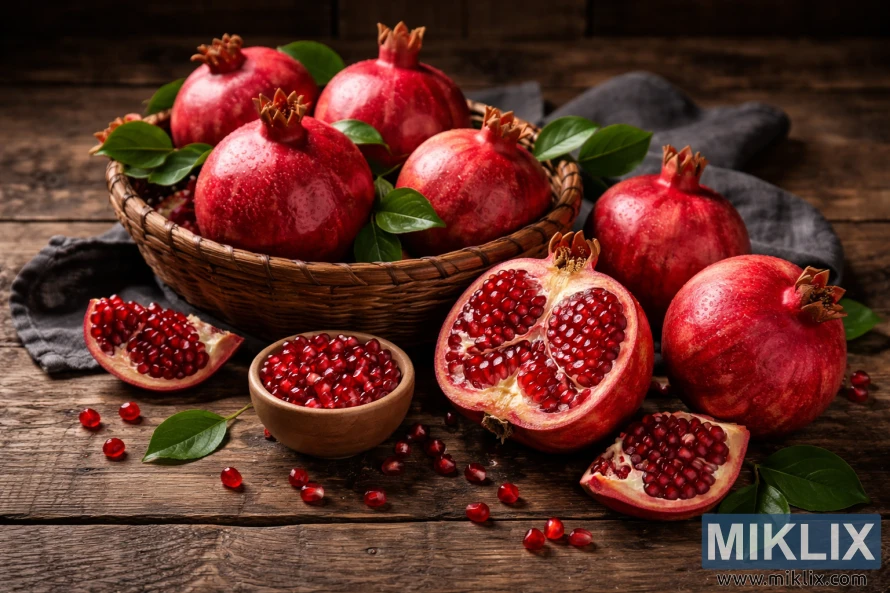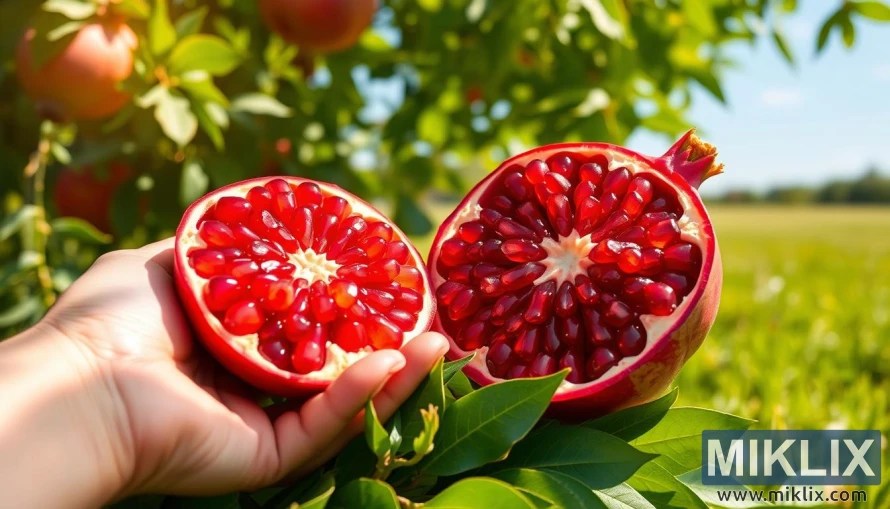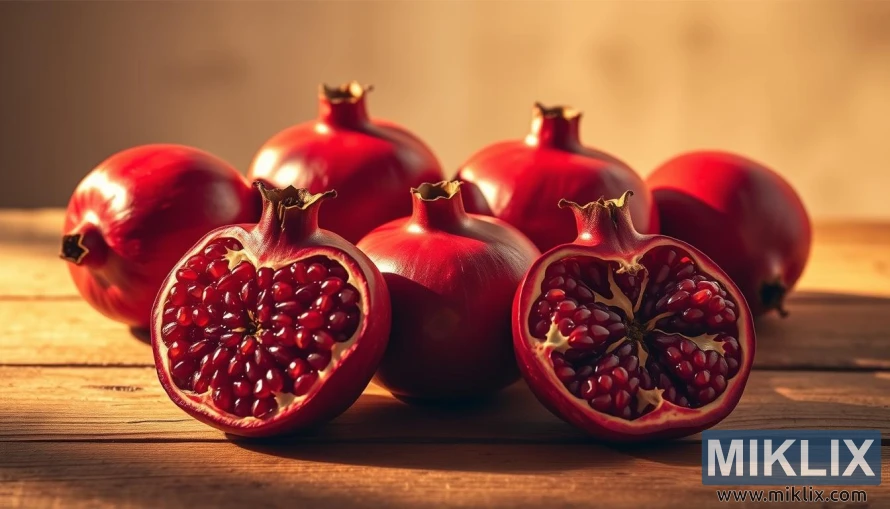Ruby Red Remedy: The Hidden Health Perks of Pomegranates
Published: May 16, 2025 at 12:15:24 PM UTC
Last updated: December 24, 2025 at 2:52:11 PM UTC
Pomegranates are known as a superfruit and are great for your diet. They are full of antioxidants, vitamins, and minerals. These nutrients help your heart, fight cancer, and boost your overall health. This article explores the many health benefits of pomegranates. It shows why adding them to your meals is a smart choice.

Key Takeaways
- Pomegranates are rich in essential nutrients and antioxidants.
- This superfruit supports heart health and aids in disease prevention.
- Pomegranates boast anti-inflammatory properties that may benefit overall wellness.
- They play a role in digestive health and skin vitality.
- Incorporating pomegranates into your diet can enhance nutrition.
Pomegranates: A Nutrient Powerhouse
Pomegranates are a treasure trove of nutrients, including vitamins, minerals, and dietary fiber. They are low in calories and fat, with about 234 calories per fruit. They also contain 4.7 grams of protein, 3.3 grams of fat, and 52 grams of carbs.
One of the key benefits of pomegranates is their vitamin C content. They offer about 32% of the Daily Value. Vitamin C is vital for a strong immune system. Pomegranates also have folate, magnesium, potassium, and phosphorus, which support bone and muscle health.
Choosing the whole fruit over juice is better for your health. The whole fruit has more dietary fiber, which is good for digestion. Juice, on the other hand, often lacks fiber and doesn't offer the same health benefits as the whole fruit.
Rich in Antioxidants
Pomegranates are packed with antioxidants. They contain punicalagins, anthocyanins, and hydrolyzable tannins. These compounds fight oxidative stress caused by free radicals.
By reducing oxidative stress, pomegranates protect cells from damage. This may lower the risk of chronic diseases.
Studies show pomegranates have more antioxidants than green tea or red wine. This makes them a strong ally for heart health and fighting aging.
Anti-Inflammatory Properties
Chronic inflammation is a silent threat that can lead to serious health issues like heart disease and diabetes. Pomegranates are a natural remedy, packed with antioxidants thanks to punicalagins. These compounds are key in fighting inflammation in our bodies.
Studies show that drinking pomegranate juice regularly can lower inflammation markers. This makes our bodies healthier. Adding pomegranates to your diet could help manage inflammation better.
Potential Anticancer Benefits
Research on pomegranates shows they might help fight cancer. Studies suggest compounds in pomegranates could help against prostate and liver cancer. They might even slow down tumor growth.
The fight against cancer cell spread is a big focus. Pomegranates' antioxidants are key in this research. They could be a great addition to cancer prevention diets.

Heart Health Benefits of Pomegranates
Pomegranates are great for your heart. They can help lower blood pressure and improve cholesterol levels. Studies show that people with heart disease feel less chest pain and see better heart health markers after drinking pomegranate juice.
The special compounds in pomegranates help keep arteries healthy. Eating pomegranates regularly might protect against heart disease. Adding pomegranates to your meals could bring lasting heart health benefits.
Supporting Urinary Health
Pomegranate extract is good for your urinary health, helping prevent kidney stones. Studies show it can stop these stones from forming. It does this by blocking the processes that lead to their creation.
The compounds in pomegranate extract help control blood levels of substances that can cause kidney stones. This is great for people who often get urinary health problems. It helps keep them healthy and feeling good.
Antimicrobial Properties of Pomegranates
Pomegranates are known for their amazing ability to fight off harmful microbes. They are a strong ally in keeping our mouths healthy. Studies show that pomegranate extracts can tackle many types of bacteria, fungi, and yeasts.
These include the ones that cause mouth infections and bad breath. Adding pomegranates to your meals can greatly help in keeping your teeth and gums clean.
The natural ingredients in pomegranates do several things:
- They cut down on harmful bacteria that can harm our teeth.
- They stop fungi and yeasts from growing, helping our mouth stay healthy.
- They make our breath smell fresher by reducing bacterial activity.
By eating pomegranates every day, you can make your mouth a healthier place. It's a great way to fight off bad microbes.
Improving Exercise Endurance
Pomegranates are getting more attention for their possible benefits in exercise. They are full of polyphenols, which might help people last longer during workouts. Athletes are curious about how pomegranate extract can help them train better.
Early studies show that eating pomegranates could really help with recovery. This is key for those who do a lot of intense exercise. It helps muscles heal faster and reduces soreness after working out.

Adding pomegranates to your diet could be a natural way to boost your exercise performance. As more research comes out, athletes and fitness fans might find new ways to use pomegranates in their routines.
Pomegranates and Brain Health
Pomegranates are full of good stuff for your brain. They contain ellagitannin, which helps protect against diseases like Alzheimer's and Parkinson's. This natural compound fights inflammation and oxidative stress, keeping your brain sharp.
Studies show that pomegranates might boost memory and brain function. As more people worry about brain health, eating pomegranates could be a smart choice. But, we need more research to fully grasp their benefits.
Digestive Health Benefits of Pomegranates
Pomegranates are a tasty fruit that's good for your gut. Eating them helps keep your gut microbiome healthy. They support the growth of good bacteria, which is key for better digestion and gut health.
Pomegranates are also high in fiber, which helps with digestion. They can make your bowel movements regular. Many people find that eating pomegranates helps with bloating and constipation.
Studies suggest that pomegranates might also protect against inflammatory bowel diseases. This makes them even more important for your digestive health.
Pomegranates and Skin Health
Pomegranates are great for your skin because they're full of antioxidants. These antioxidants help protect your skin from damage caused by free radicals. Free radicals can make your skin age faster and get damaged.
Research shows that pomegranate juice might act like a natural sunscreen. It helps reduce redness in the skin caused by the sun. This is important for keeping your skin looking young and healthy.
Eating pomegranates regularly can make your skin stronger. They help keep your skin hydrated and can even out your skin tone. This is because they fight inflammation. Adding pomegranates to your meals is a tasty way to boost your skin's health.
Supporting Joint Health with Pomegranates
Pomegranates are gaining attention for their benefits in joint health. The juice and seeds of this fruit may help with arthritis symptoms. This includes both rheumatoid and osteoarthritis. The antioxidants in pomegranates can reduce inflammation, a big problem for those with joint issues.
Adding pomegranates to your diet could improve your mobility and lessen pain. Here are some reasons to try pomegranates for better joint health:
- Contains potent antioxidants that combat oxidative stress in joint tissues.
- May reduce inflammation and swelling linked to arthritis.
- Supports overall mobility and flexibility in individuals with osteoarthritis.

Pomegranates are not just good for your joints; they're also great for your overall health. Enjoy them as juice, in salads, or as snacks. They're a tasty way to support your joints.
Culinary Uses of Pomegranates
Pomegranates add a burst of flavor and nutrition to dishes. The small, juicy arils, or pomegranate seeds, are great raw. They add texture and taste to salads.
For a refreshing drink, blend the seeds into smoothies. Or extract the juice for vibrant beverages.
Pomegranate juice is a versatile ingredient. It's popular for dressings and marinades. The thick, tangy pomegranate molasses adds depth to sauces.
It gives a unique twist in cooking. Adding pomegranates to your recipes boosts flavor and nutrition. Get creative and experiment with various culinary uses to fully appreciate this exquisite fruit.
How to Select and Store Pomegranates
When picking pomegranates, look at their weight and skin. Choose ones that are heavy for their size and have a bright red color. This color shows they are ripe and will taste great.
For storing, keep pomegranates in a cool, dry spot or the fridge. The fridge keeps them fresh longer. This way, you can enjoy them for weeks. Make sure they're uncut to keep them fresh and taste the best when you eat them.
Potential Risks and Considerations
Pomegranates are tasty and good for you, but they can pose some risks. People with certain health issues might need to eat them less. For example, those on ACE inhibitors or blood thinners should talk to their doctor. This is because pomegranates could affect their treatment.
Some people might be allergic to pomegranates, though it's rare. Signs of an allergy include itching, hives, or trouble breathing. If you've had food allergies before, be careful with pomegranates. You might want to see an allergist before adding them to your diet.
Knowing about these risks is key to staying healthy while enjoying pomegranates. Always think about your health and talk to experts when needed.
Conclusion
Pomegranates are a superfood with many health benefits. They help keep your heart healthy and may even prevent cancer. Adding them to your diet can improve your skin and digestion.
Pomegranates are easy to add to your meals, like salads or smoothies. They are full of antioxidants and anti-inflammatory compounds. This makes them a great choice for a healthier lifestyle.
Pomegranates taste great and offer many health benefits. They should be a key part of your diet. Enjoying pomegranates is more than just a tasty treat. It's a way to take care of your health.

Further Reading
If you enjoyed this post, you may also like these suggestions:
- Psyllium Husks for Health: Improve Digestion, Lower Cholesterol, and Support Weight Loss
- Fenugreek Benefits: How This Ancient Herb Can Transform Your Health
- Unlock Calm and Vitality: How Ashwagandha Enhances Mind, Body, and Mood
